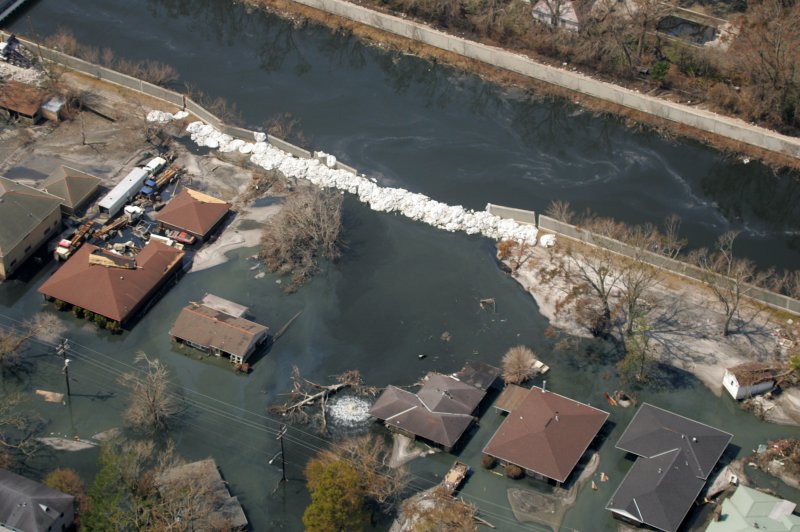1 of 11 | Large parts of New Orleans remain flooded two weeks after several levees failed in the wake of Hurricane Katrina on Sept. 14, 2005. A break in a levee is seen patched with sand bags. A federal judge ruled Friday the Army Corps of Engineer is liable for flooding in the New Orleans area, including the Lower Ninth Ward and nearby St. Bernard Parish, after Katrina. Photo courtesy Bob McMillan/ FEMA |
License Photo
WASHINGTON, May 2 (UPI) -- The United States government must pay for some of the devastating Hurricane Katrina flooding damages in New Orleans caused by a faulty canal system hastily installed decades ago, a federal judge ruled Friday.
Judge Susan Braden, of the United States Court of Federal Claims, ruled the Army Corps of Engineers is liable for flooding in the New Orleans area, including the Lower Ninth Ward and St. Bernard Parish, after Hurricane Katrina in August 2005. Braden focused on an Army Corp navigation project known as the Mississippi River-Gulf Outlet, or MR-GO, which essentially funneled flood waters into the parish areas. The canal has since been closed.
In her ruling, Braden admonished the Justice Department for pursuing "a litigation strategy of contesting each and every issue—whether evidentiary or substantive."
Braden referred to the 76-mile canal as a "ticking time bomb," adding that it had "substantially expanded and eroded." It was built in the late 1960s, but quickly determined as a danger to the local ecology.
"Certainly by 2004, the Army Corps no longer had any choice but to recognize that a hurricane inevitably would provide the meteorological conditions to trigger the ticking time bomb created by a substantially expanded and eroded MR-GO and the resulting destruction of wetlands that had shielded the St. Bernard Polder for centuries," Braden wrote.
"In August 2005, when Hurricane Katrina struck the St. Bernard Polder, the Army Corps was still discussing whether to close the MR-GO and whether Congress would fund the closure. Neither Congress nor the Army Corps had the opportunity to correct the situation before the MR-GO induced substantially increased storm surge that caused catastrophic flooding on private property—as well as the loss of human life," she wrote.
Joe Bruno, an attorney in several Katrina lawsuits, said the ruling was not a surprise
"Yet another federal judge has found that the corps of engineers was negligent and caused the flooding of this community," Bruno told WWLTV."How many times do we have to hear that?"
Braden did not set an amount for the government to pay. A hearing is set for Wednesday with a mediator.















